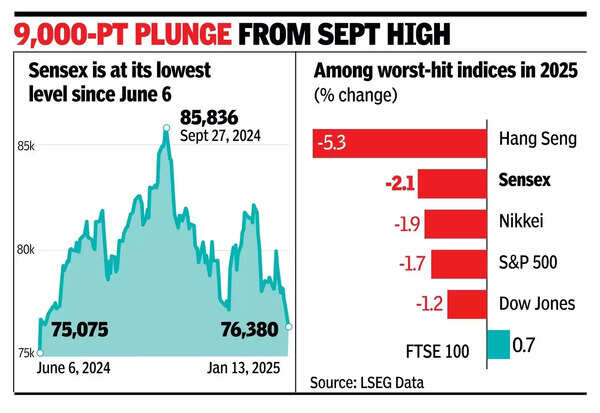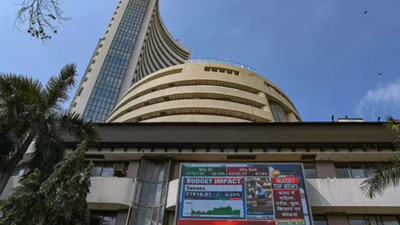MUMBAI: India’s market capitalisation fell below the $5-trillion mark for the first time in over seven months, thanks to a sliding market and a weakening rupee. India’s market cap was a little over $5.7 trillion at its peak on Sept 27, 2024. On Monday, it closed at $4.8 trillion.
Investor sentiment on Dalal Street was affected by a weak US market closing on Friday night due to a strong US jobs data earlier in the day that further dimmed chances of aggressive rate cuts in the coming months in the world’s largest economy. The day’s selloff shaved off 1,049 points from the sensex that closed at 76,330 points, an over 7-month closing low level.
“The global markets witnessed a significant sell-off, prompting a similar response in domestic markets due to strong US payroll data suggesting fewer rate cuts in 2025,” said Vinod Nair of Geojit Financial Services. “This has strengthened the dollar, driven up bond yields, and made emerging markets less attractive. Recent GDP downgrades and slowing earnings amidst higher valuations are weighing heavily on (domestic) market sentiment.”

On Monday, midcap and smallcap stocks witnessed even stronger selloff than blue chips. The combined effect led to a total loss to investors’ wealth worth about Rs 12.6 lakh crore with BSE’s market cap now at Rs 417 lakh crore. The day’s selling was led by foreign funds that clocked a net outflow of nearly Rs 4,900 crore while domestic funds were net buyers at Rs 8,067 crore.
A spiking crude oil prices – after the US President expanded the ban on oil from Russian – also impacted investor sentiment on Dalal Street as the move further weakened the rupee and could eventually lead to rise in inflation. “Rising crude oil prices would raise concerns of a spike in domestic inflation, which could further delay any rate cut hopes from RBI in the near to medium term,” said Prashanth Tapse of Mehta Equities.
In Monday’s market, of the 30 sensex stocks, 26 ended in the red, BSE data showed. HDFC Bank, ICICI Bank and Zomato contributed the most to the day’s slide. Higher closings in TCS, Axis Bank, HUL and IndusInd Bank cushioned the fall, but only marginally. In the short run, among others the rupee-dollar exchange rate, trading trend by foreign funds and the crude oil prices would decide the market’s trend, dealers said.




